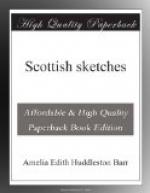Mysie had left the room, and as she returnee with a little bundle Andrew was anxiously asking, “What was the lassie’s maiden name, Davie?”
“Bessie Dunbar, father.”
“Then this is a wun’erful day; we are blessed and twice blessed, for I found your wife and bairn, Davie, just where John Sugden found you, ‘mang the Druids’ stanes; and the lad has my ain honest name and is weel worthy o’ it.”
“See here, Davie,” and Mysie tenderly touched the poor faded dress and shawl, and laid the wedding-ring in his palm. As she spoke wee Andrew came across the yard, walking slowly, reading as he walked. “Look at him, Davie! He’s a bonnie lad, and a gude are; and oh, my ain dear lad, he has had a’ things that thy youth wanted.”
It pleased the old man no little that, in spite of his father’s loving greeting, wee Andrew stole away to his side.
“You see, Davie,” he urged in apology, “he’s mair at hame like wi’ me.”
And then he drew the child to him, and let his whole heart go out now, without check or reproach, to “Davie’s bairn.”
“But you have not finished your story, Mr. Cargill,” said John, and David sighed as he answered,
“There is naething by the ordinar in it. I went back to the warks I had got a footing in, the Glencart Iron Warks, and gradually won my way to the topmost rungs o’ the ladder. I am head buyer now, hae a gude share i’ the concern, and i’ money matters there’s plenty folk waur off than David Cargill. When I put my father’s forgiveness, my mither’s love, and my Bessie’s bonnie lad to the lave, I may weel say that ‘they are weel guided that God guides.’ A week ago I went into the editor’s room o’ the Glasgow Herald,’ and the man no being in I lifted a paper and saw in it my father’s message to me. It’s sma’ credit that I left a’ and answered it.”
“What paper, Mr. Cargill, what paper?”
“They ca’ it ‘The Watchman.’ I hae it in my pocket.”
“I thought so,” said John triumphantly. “It’s a grand paper; every one ought to have it.”
“It is welcome evermore in my house,” said Davie.
“It means weel, it means weel,” said Andrew, with a great stretch of charity, “but I dinna approve o’ its doctrines at a’, and—”
“It found David for you, Andrew.”
“Ay, ay, God uses a’ kinds o’ instruments. ‘The Watchman’ isna as auld as the Bible yet, John, and it’s ill praising green barley.”
“Now, Andrew, I think—”
“Tut, tut, John, I’se no sit i’ Rome and strive wi’ the pope; there’s naething ill said, you ken, if it’s no ill taken.”
John smiled tolerantly, and indeed there was no longer time for further discussion, for the shepherds from the hills and the farmers from the glen had heard of David’s return, and were hurrying to Cargill to see him. Mysie saw that there would be a goodly company, and the long harvest-table was brought in and a feast of thanksgiving spread. Conversation in that house could only set one way, and after all had eaten and David had told his story again, one old man after another spoke of the dangers they had encountered and the spiritual foes they had conquered.




